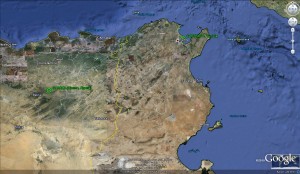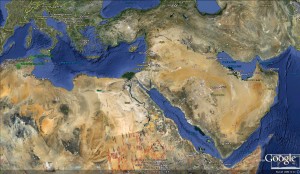Sunday, June 12th, 2011...8:44 amChris Francese
The Wrath of Iarbas (Vergil, Aeneid 4.196-218)
protinus ad regem cursus detorquet Iarban
incenditque animum dictis atque aggerat iras.
Hic Hammone satus rapta Garamantide nympha
templa Iovi centum latis immania regnis,
centum aras posuit vigilemque sacraverat ignem, 200
excubias diuum aeternas, pecudumque cruore
pingue solum et variis florentia limina sertis.
isque amens animi et rumore accensus amaro
dicitur ante aras media inter numina divum
multa Iovem manibus supplex orasse supinis: 205
‘Iuppiter omnipotens, cui nunc Maurusia pictis
gens epulata toris Lenaeum libat honorem,
aspicis haec? an te, genitor, cum fulmina torques
nequiquam horremus, caecique in nubibus ignes
terrificant animos et inania murmura miscent? 210
femina, quae nostris errans in finibus urbem
exiguam pretio posuit, cui litus arandum
cuique loci leges dedimus, conubia nostra
reppulit ac dominum Aenean in regna recepit.
et nunc ille Paris cum semiviro comitatu, 215
Maeonia mentum mitra crinemque madentem
subnexus, rapto potitur: nos munera templis
quippe tuis ferimus famamque fovemus inanem.’
Carthage and Garama, main town of the nomadic Garamantes. Numidia, home of Iarbas, was to the north of Garama, and to the west of Carthage.
Egypt and Siwa, the oasis with the famous temple of Ammon, whom the Greeks and Romans identified with Zeus/Jupiter
Provinces of the Roman Empire, showing Numidia, home of Iarbas, and Mauretania to the west.
Translation (by Francese with lots of help from R.G. Austin (P. Vergili Maronis Aeneidos Liber Quartus [Oxford 1955], pp. 75 ff.):
Immediately Rumor turned her course to King Iarbas and she inflamed his mind with her words and heaped up his rage. This man, sprung from Hammon, on the ravishing of a Garamantian nymph built a hundred huge temples in his wide realm (Numidia), a hundred altars, and he had sanctified an eternal fire, sentinel of the gods everlasting, and the ground was thick with the blood of sacrificial animals, the entrances all aglow with gay garlands. And he, utterly distraught of mind, and enraged by the sour rumor, is said to have prayed much to Jupiter as a suppliant before the altars in the very presence of the majesty of the gods with his hands turned upward:
“All-powerful Jupiter, to whom the Maurusian race offers the wine-god’s rich libations as it holds banquets on multi-colored couches: do you see these things? Can it be in vain, my father, that we shiver as you whirl your thunderbolts? Are they blind, those flames among the clouds that make our hearts to quake? Is it empty mutterings that they stir? A woman, who while wandering in our territory founded a puny city for a price, to whom we gave a piece of shore to plough and conditions of holding it, she has thrust away our marriage proposal and taken Aeneas into her realm as her master. And now, that Paris with his half-man retinue, his chin and essences hair wound about with a Lydian turban, enjoys what he has filched, while we keep bringing presents to your shrines—yes, to yours—and coddle your great name, for nothing.”
Podcast: Play in new window | Download
Subscribe: Apple Podcasts | RSS




1 Comment
June 12th, 2011 at 10:40 pm
Awesome! Really, you should do these at least twice a month!
Leave a Reply